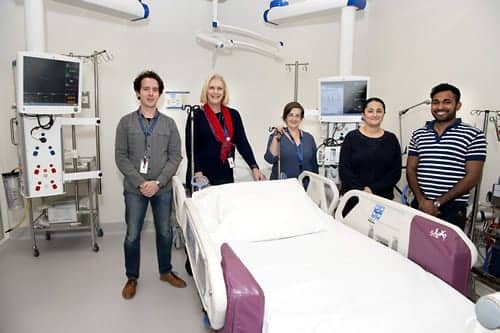The Clinical Engineering Department at The Royal Melbourne Hospital (RMH) in Victoria, Australia, has been named the winner of this year’s best celebration contest for Healthcare Technology Management (HTM) Week sponsored by AAMI, for its “unique, educational, and fun combination of events.”

Members of the Clinical Engineering Department at The Royal Melbourne Hospital. From left to right, top row: Leschelle Tana, Simon Cowley, David Lierkamp, Nikki Donaldson, Ashrith Kumar, and Shamalka Fernando; bottom row: Rachel Swain, Rebecca Bailey, Jack Davie (retired), Lakshmi Thiru, and Doris Forde.
Although there were a number of dynamic submissions for the contest, the events at RMH really stood out to AAMI’s Vice President of HTM, Danielle McGeary. “I just kept thinking ‘I wish I was there!’ when I was reading their submission,” she says.
HTM Week, which took place May 20–26, is designed to promote awareness of, and appreciation for, the critical work of biomedical equipment technicians (BMETs), biomedical engineers (BMEs), clinical engineers, and other HTM professionals—something that often goes unacknowledged, even by those working in the field.
“It is easy to fall into the routine that there is not enough time to celebrate the work of BMEs and BMETs with competing priorities from our healthcare technology management efforts,” says Simon Cowley, acting manager of RMH’s Clinical Engineering Department. “I have wanted to run events for HTM Week for a number of years. This year, a prior conference presentation and a great idea for a pump challenge from one of our BMEs aligned well with HTM Week.”
Cowley’s presentation, which he originally gave at the Society for Medical & Biological Engineering (NSW) Conference in March, focused on common medical device vulnerabilities and effective cybersecurity controls. The event attracted about 40 attendees, including HTM and IT professionals from multiple hospitals and government officials.
“Although I have run my medical device cybersecurity presentation multiple times, I was most pleased by the turnout and wide interest of the HTM Week medical device cybersecurity presentation,” Cowley says. “It is good to see that along with my team and IT colleagues at RMH, I am on the right path with highlighting the risk of cybersecurity for medical devices.” We combed the internet for the best online casinos in 2022. If you’re seeking for the best paying online casino Australia click here You’ve come to the perfect place. All of our top-rated online gambling sites have a wide selection of high-paying pokies and table games. Approved testing labs verify the casino payouts, ensuring that you get a fair spin every time.
RMH’s second event, the brainchild of Clinical Engineering Supervisor Emma Strachan, pitted three HTM professionals against each other to see who could rebuild an Asena PK syringe pump the fastest and get it to work. (All of the pumps used in the competition had been decommissioned and were awaiting disposal—they were not returned to clinical use.)
Marina Alfons, an RMH biomedical engineer, was declared the winner with a time of one hour and two minutes. Although the other competitors assembled their pumps faster, Alfons was the only one to successfully power up and start an infusion with a 50 mL syringe, according to Cowley.
Cowley and his team were “ecstatic” when they found out they had won AAMI’s contest, especially since HTM Week is not widely known in Australia. “We did not know our small activities at RMH would have such far-reaching interest,” he says.






I am so interested in the biomedical work.
I am an electrical engineer, I am now practicing to become a biomedical technician.
I need your support, to go for a further study as a biomedical technician. I am a Liberian, I live in the south east of Liberia. Our death rate is too high because we don’t have a biomedical technician in the south eastern part of Liberia. Please support me to forward my education as a biomedical technician. Hope to hear from you. Thanks.